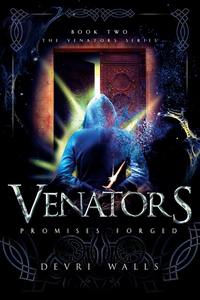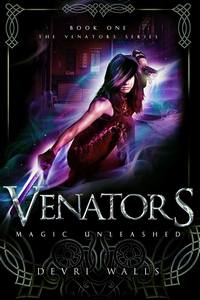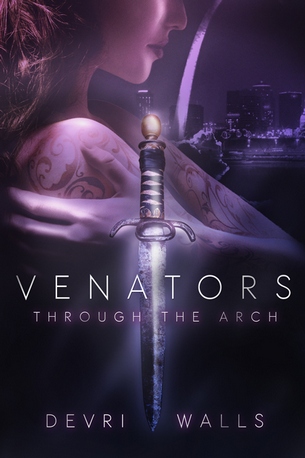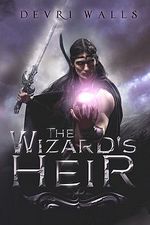by Devri Walls
Series: Venators, #2
Paperback, 428 pg.
Brown Books Publishing Group, 2019
Read: May 3 – 7, 2019

I’m about a month late with this one — every time I sat down to write it, I decided I wanted to chew on things a bit more (and then I arranged to do a Q&A with the author in conjunction with the post and so I bought myself some time to let things stew while she found time to get the answers done). Now that I have her answers in my inbox, I have no excuse to put this off. So, despite some of my thoughts still being half-baked, here we go…
And yes, that was one very convoluted series of food metaphors. That really doesn’t inspire a lot of confidence in this post, does it?
So the ending of the previous book (Venators: Magic Unleashed) focused on a dragon being unleashed by the series’ (apparent) Big Bad, the sorceress Zio. Not surprisingly, the series central characters survived the encounter. This book starts with a quick recap of that survival from the point of view of Zio — which is a great way to get the reader back into the moment and build on their understanding of what happened and Zio.
We quickly return to our Earthlings, Grey and Rune and the aftermath of their unauthorized excursion to rescue humans from a werewolf pack, which culminated in the aforementioned dragon attack. Rune’s proving to be a quick study of Council politics and was able to turn things to their advantage and buy them some leniency from the Council. The ways the two humans respond to and interact with Council members is pretty interesting and I suspect will be one of the more interesting developments from this point forward in the series. I suspect the Venator abilities that make these two the warriors they are in this world are in play with Rune’s politicking — no one mentions mental acuity when talking about Venator abilities, but maybe they should. Watching Rune play the games (both successfully and less-so) that the various Council members throw her way is probably my favorite part of the character.
And she has to do a lot of politicking and game playing here, because her co-Venator and friend Grey has found himself in quite the pickle. After their ordeal with the werewolves, the two Earthlings’ need for training was even more apparent. They get just a little of it (a good, promising start) before getting momentarily side-tracked. Before they get a chance to build on that, Grey is lured into the one place the two have been told they absolutely cannot go. Because forbidding people from going somewhere always works out (how many Hogwarts students stayed out of the forest? How long did Belle stay out of the West Wing? Even the Federation had to know that forbidding landing on Talos IV wouldn’t work for long).
Grey has found himself in the clutches of a powerful Fae, Feena. Feena will spend days/weeks/years sucking the life out of her prisoners to feed her own magics. Given that Grey is more powerful than your typical Eonian, you know she’ll drag it out as long as possible. It’s a torturous experience for Grey, but he does what he can to resist and fight back. On the one hand, watching him stupidly and blindly put himself in this situation was maddening. But after that, watching Grey endure what he has to and struggle in response is pretty cool. As much as I appreciate Rune’s playing politics, I enjoy watching Grey in action.
So the book boils down to this — can Rune get permission to run a rescue mission — or at the very least, find a window in which she can pull off another unauthorized mission? Can Grey survive long enough for the cavalry to arrive? Assuming they do, how can Grey be rescued and the Venators get back to their training without causing a diplomatic incident that will shake up everything?
The actions of the Venators’ guides, teachers, allies confuse me. They’ve got these two kids in a world they clearly don’t understand, with abilities they don’t understand and then expect them to react appropriately in new situations. Even worse, all of them are keeping things from Grey and Rune — telling them half-truths, deflecting legitimate questions and delaying explanations. It’s maddening. It’s bad enough that the Council, who are clearly only using these two for their own ends do that, but the people who supposedly are looking to them to change the world? A little honesty, being a little forthcoming, helping them to avoid the minefields they keep running into rather than saying “oh, you shouldn’t have done that” — it would make it a lot easier for this reader to stomach them.
The Council? I need to see more of them. I have little patience for them as individuals or as an entity at the moment, but as individuals and as an entity there’s great potential for something interesting to happen. Feena’s a good villain — she’s not worth several books, but for one novel? She’s a good opponent. The Fae? It’s simple — any universe, any world, any author — when it comes to Fae politics, Fae dealings with other Fae, Fae dealings with non-Fae? It’s complicated, tricky and messy. It’s good to know you can count on something.
So much is happening in a very short period of time, it’s hard to know what kind of impact the events are having on anyone — it’s been less than two weeks since these two jumped into this world, leaving St. Louis behind. It’s hard for them — or a reader — to really take it all in. We do know that already both Venators are changing because of their abilities (as well as the experiences in this new world) — both are self-aware enough to see how it’s happening (at least in part) and are both resisting and embracing the changes. Both are, naturally, deluded about how easy it will be to resist this kind of thing — denial’s not just a river on Earth.
I’m enjoying these books — I do hope that under the new publisher, they’re able to come out pretty regularly, it’ll help sustain my interest (and, I’m guessing, the reading public’s). I know that Walls has several more books planned, so it makes it okay that I’m still on the fence about the series as a whole — there’s a lot of potential to the series and these characters and she has time to help them reach their potential. There are aspects of the books (the prospective — and lingering — romantic entanglements, for example) that I’m withholding an opinion on until more happens. And I’m not sure if I should appreciate how little we’re getting with Zio and Rune’s brother, or if it should annoy me. Is Walls building suspense, or is she simply being obfuscatory? I’m hoping that after Book 3, I’ll be more settled with my expectations about these books — I know I’m enjoying them, I’m just not sure if I should wait on them getting better.
An interesting world, great characters (even if they frustrate me), good action — and a fast moving plot. This YA fantasy is a crowd pleaser, I’m sure of that — you should join the crowd.
—–












